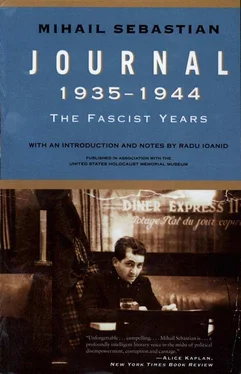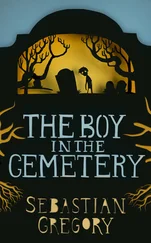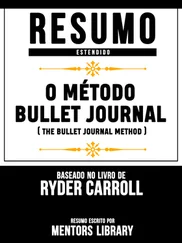I think about her with pleasure, distracted by her memory and hoping that time will relieve me of its more painful edges.
Too hot for me to write. For sometime now I should have liked to note here at least a long conversation with Nae and then — in another order of things — a very complex dream of which I was quite aware during the night because I repeated it several times on waking up, but of which now, after a few days have passed, I can remember only a few vague remnants.
A desolate moon, with absolutely nothing there. Three days in Constanta, which could have been restful, did me no good at all. I returned feeling ill, with a temperature of 41 degrees [106 F.]. I am still not back to normal. I have no wish for anything. Ashes and glue — that’s all.
Unfortunately I am fully cured of love’s passions and torments.
I shall try to write down a dream just now, as I wake from sleep. . I am reading an article by Crevedia 3—in Porunca Vremii, 4I think — which praises Dinu Brătianu 5to the skies.
. . I am at Dinu Brătianu’s house. I am holding a jug of water or something like that (I don’t think it was a jug of water). Feeling embarrassed, I put it down on the table. He gives me his hand and, when I tell him who I am, he says that he knows me and is extremely friendly.
. . I am in an adjoining room where there are a lot of people — a meeting, perhaps. Dinu Brătianu says that he had his picture taken earlier in the day. I tell him I have seen a good photograph of him in the window of Julieta. He is surprised: it is years since he has had his picture taken. But I tell him that I did see it.
“That window,” I say, “is a fragment of topicality — topicality that lasts a few hours or less, but is nevertheless alive. Whenever you do something that causes a stir — a speech or a letter to Mr. Tătărescu — your photo appears in the window.”
What I say seems to have a lot of verve, because everyone laughs and I myself am happy with the effect I have. Meanwhile, however, the bow tie I am wearing has somehow climbed onto my chin and now my mouth, so that I am no longer able to speak. Feeling embarrassed, I apologize to Dinu Brătianu and go into an adjoining room, where a friend — a kind of chauffeur or secretary of mine — arranges my bow tie.
When I return, I find the room is silent. Everyone is listening to a report on student movements. The tone is very anti-Semitic. I feel awkward.
At that point a wedding party for which we seem to have been waiting all this time returns from church. Puia Rebreanu enters wearing a lamé bridal dress. At that same moment Dinu Bràtianu (who has stepped out of the dream) is no longer sitting on his chair; Liviu Rebreanu 6is there instead. I make a sign that we should stand up, but Rebreanu makes a sign for the lecture to continue. Then the wedding guests rush in. Camil Petrescu 7holds out his hand to embrace me, but I have two big sweets in my mouth and am unable to reciprocate. He embraces Ionel Jianu 8and then Paul Moscovici. Meanwhile I have removed the sweets from my mouth and also embraced someone. I think it is Paul Moscovici.
The procession keeps moving, but now it seems to be a baptism rather than a wedding―or both at the same time. Auntie Caroline enters with a baby in her arms and passes alongside me. She is followed by Uncle Avram. Apparently Baba and Frida have died that very day. They have been to the cemetery with the baby and all the wedding guests. They want to name the child after the old ones. At the cemetery a lot of funny things happened with an old woman from the family whom no one recognized; she wept loudly for some distant relatives who died dozens of years ago.
That was roughly it. I think there were some more confused things toward the end. But I have lost quite a bit of the beginning of the dream. Further on, almost everything is there.
Only a last-minute oversight before leaving (it will be four weeks tonight) made me forget this notebook at home. Had I had it with me in Ghilcoş, there would have been so many things to write. I probably would have recorded in it the stages of my detoxification — because a detoxification is what it has been. My natural aptitude for happiness is great indeed. I confirmed this in Ghilcoş, where, after the first days of lazing in the sun, I was cured of the whole business: my confused state following the unhappiness of July, the painful remnants of the affair with Leni (which, fortunately, I now think is well and truly over), and my apathy burdened with so much renunciation. I could observe a total return to health, both moral and physical. One indication of this is the ease with which I now fall asleep, without all those complex mental constructions that I used to enter night after night — before my departure for Ghilcoş—in order to find my way into slumber.
I was decidedly happy there. Everything seemed right — easy and harmonious. How lucky I was to be reading Charles Morgan’s Fontaine, so appropriate to my own mood during this blessed August. If I had taken this notebook with me, I think I would have filled whole pages on such themes.
How welcome and diverting was the episode with Margo, and how well concluded. It is a pity that I could not record its various stages— from the time she arrived at the hotel in the provocative company of that Herr Direktor Hellmann from Oradea, to the evening after he had left when I went to bed with her. Everything was so nice that I feel obliged to answer her letter, even though the story is over and done with.
Let us draw a balance sheet. I have come back refreshed, or “re-created.” I am proud of myself when I look in the mirror: so young, so visibly healthy (perhaps too visibly). This afternoon I shall go to the photographer’s — so that that at least will remain, if nothing else can.
Pensiunea Wagner — a wonderful establishment!
Had a long conversation yesterday evening with Mircea, 9Nina, Marietta, 1and Haig. 2I was very happy to see them again, and everything seemed in keeping with my optimistic frame of mind.
On the other hand, my walk in town this morning disheartened me. It is still very hot: summer is not yet over. People are pale from the heat, tired, prickly, reluctant to work. I went to pay Montaureanu for my journals 3and felt depressed by everyone’s long yellow faces. And when I went to see Ocneanu, 4to tell him that I would soon be delivering the manuscript, I found him completely listless.
How long will I manage to keep my present optimism among such bored, indifferent, dead-tired people?
On Monday I go to the office; this evening to the journal.
Lunch at Capşa with Comarnescu and Soreanu, 5who suggested that I do a weekly French bulletin for Excelsior. 6Maybe I’ll accept, but it would be a little sad to find myself on Soreanu’s payroll! Another opportunity to reflect, with resignation and no ill will, on my ineptitude in practical matters and the happy adroitness of others. I shall never get beyond a more or less bearable level of poverty: I shall never have a career, never have money. . And, speaking quite frankly, without any reason to deceive myself, I think that I am indifferent to money. All I want from life is a little peace and quiet, a woman, some books, and a clean house.
Comarnescu told me something which, if I were feeling less skeptical at the moment, would strike me as quite monstrous. He has made peace overtures to Credinţa! 7He has had lunch with Stancu! I should say that he is unspeakable. But I shall content myself with observing once more how naive I am. I fell out with the Credinţa people over that business; I refused to shake hands with Sandu Tudor. — All that to end up now with such a capitulation. When will I stop getting carried away in my relations with other people? To be disinterested and neutral, never indignant or approbatory: that is the best of attitudes. I am old enough to have learned that at least.
Читать дальше











